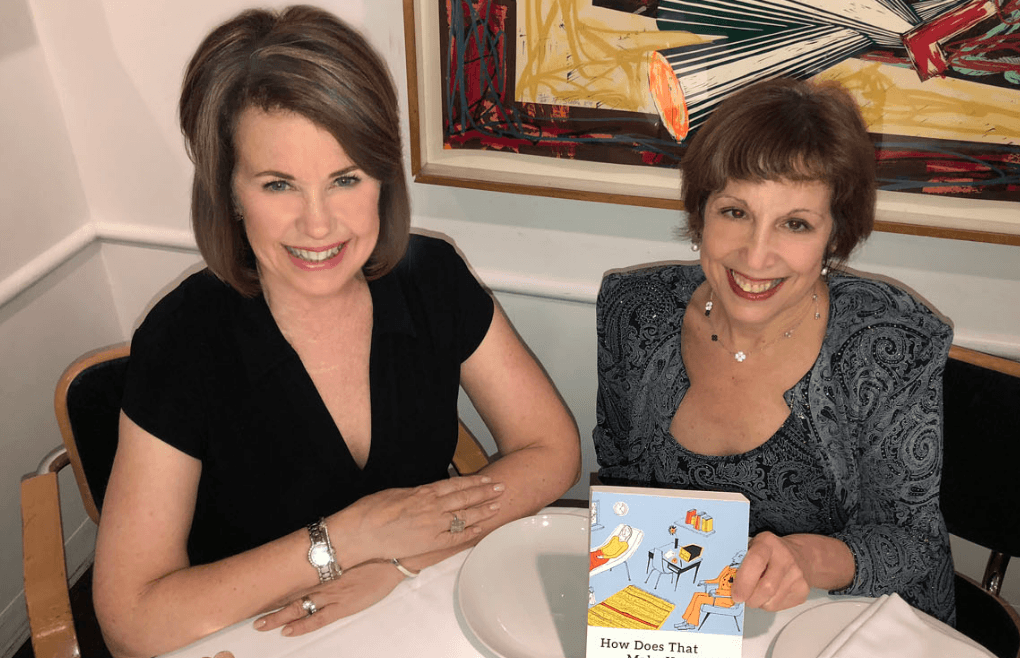Did you know that May was National Mental Health Awareness month? Neither did I, but this week’s interview with Sherry Amatenstein, the New York City-based therapist, author and editor of How Does That Make You Feel True Confessions From Both Sides of the Therapy Couch (Seal Press) seemed particularly timely given the insane news cycle of celebrity implosions and, of course, pretty much everything going on in Washington, DC. I knew we were going to have plenty to talk about when I asked Sherry what she thought of the extraordinarily anti-social and downright scary behavior we’ve seen from celebrities and politicians in the past year, and she said, “My philosophy is everyone is crazy.” Alrighty then, let get down to it.
In a former life, Sherry was an editor at Hearst and ivillage and has written for many publications and websites including New York, The Washington Post, Observer, Reader’s Digest, Brides and Marie Claire. She is also the author of The Q&A Dating Book, Love Lessons From Bad Breakups and The Complete Marriage Counselor. “Working for so long as a journalist was great preparation for becoming a therapist. In publishing, you’re supposed to be a blank slate, as a therapist that’s true too. You have to be an active listener for both,” she said. After 9/11 (she was a volunteer at Ground Zero), Sherry decided to make a life change. She spent two years volunteering at a suicide hotline. Then she went back to school to become a therapist. “Being a therapist was something I always wanted to do,” she told me between bites of lobster salad. “I wanted to do something more meaningful.” Besides working on her books, Sherry still writes articles and recently penned a piece for Playboy.com on men’s feelings towards the Time’s Up movement.
As the child of Holocaust survivors (“My father was at Auschwitz. He watched his parents and little sister walk to the gas chamber, and my mother was in a work camp”), she understands trauma and has channeled that empathy through some of her work. She was an interviewer for Steven Spielberg’s USC Shoah, a foundation dedicated to taking audio-visual testimony from Holocaust survivors. “It left me with a feeling of amazement about the resilience of the human spirit,” she said.
I asked how she would describe a therapist’s role and she said, “A good therapist isn’t there to give advice, sometimes I do, but really, therapists are there to help the person help themselves.” Since it’s impossible to come up with a definitive list of traits that make up a good therapist for everyone, I asked her to tell me something a bad therapist would do. “Someone once asked me, ‘Is it normal for my therapist to ask me to pick up her dry cleaning?’” In case you were wondering, the answer is no. I was surprised to learn that therapists do turn down patients. “If I can’t stomach [the person], I tell them I wouldn’t be a good therapist for them and recommend someone else. It’s only happened once or twice.” I’m thinking judging by her visceral reaction to Harvey Weinstein – “He’s sick!” He best not come looking for help. And if his defense team foists a ‘sex addiction’ defense, Sherry isn’t buying it. When I asked her if that is a real addiction she didn’t miss a beat. “I’ve not seen any evidence supporting that.”
Sherry describes Donald Trump as “narcissistic with sociopathic tendencies and no conscience at all.” She told me Trump was a huge (no pun intended) source of anxiety for many people she came into contact with after the election. “A lot of people cried after he was elected. Everyone was shell-shocked. I did free support groups for women who were deeply triggered by him and had a hard time after he won.”
All of this, said Sherry, has put the state of the country’s collective mental health “on life support.” She explained it this way: “There is an undercurrent of fear and people are scared. When that happens, it’s easy not to focus on your stuff and lash out. People should not push their emotions down. It’s so uncomfortable to sit with fear, depression, and uncertainty. When you’re scared [of your issues], it’s easy to focus on other stuff. The divisiveness is toxic. We need to recognize that everyone is just another person no matter what side [politically] they’re on.”
I asked Sherry, who mostly treats adults but sees some teenagers, if the topics of conversation that come up with her young patients are any different from the things we worried about as kids. “When we were twelve-years-old, we thought, ‘Nothing is going to hurt me.’ These kids don’t feel that way because they know that isn’t true.” A relative of Sherry’s was at Parkland school at the time of the shooting. As traumatic as that event was, she told me the students’ reactions “was the first thing that gave me hope in a long time” adding “those kids as still young and not as beaten down as we are so that believe they can change things.”
I told her one of the most upsetting moments I’ve ever had as a parent came the day after the Parkland shooting when my 13-year-old daughter broke down in tears at breakfast and told me she was afraid to go to school. What is a parent supposed to do at a time like that? “You have to let kids talk,” she said. “They need to be heard. You can’t trivialize their feelings. This is real.”
Actually, said Sherry, “We’re having trouble listening to different points of view.” But there sure is a lot of talking. “The 24/7 news cycle of sensationalism and fear and social media have made it really difficult for a lot of people – especially people with mental health issues. Everyone is so reactive; it’s like emotional bumper cars.” She advises a “really limited” use of social media if you’re struggling with an emotional issue. “It’s very important because people are just comparing themselves to the lives of others they see and thinking cyber relationships are real relationships. Social media addiction is a real thing, and it’s dangerous.”
With so many television therapists in the mix these days, I had to get Sherry’s take on some of my favorites. Billions’ Dr. Wendy Rhodes (“She’s so manipulative”), the tortured soul-slash-shrink played by Gabriel Byrne on the late, lamented In Treatment (“He definitely had issues, but he did a lot of good, too”) and Lorraine Bracco as Tony Soprano’s therapist on The Sopranos (“She crossed a lot of boundaries”). We both agreed that the caring, no-nonsense therapist that helped the abused wife played so brilliantly by Nicole Kidman on Big Little Lies was “very realistic, and she really did help [that character].”
Speaking of Hollywood, Sherry is currently researching her next book which will be about celebrities and their mental health issues. No shortage of material there. “So if Kanye wants to call, I’m available!” Maybe she should reach out on Twitter.
Busy Sherry is also co-leading a writing weekend at the Omega Institute in Rhinebeck, New York from June 8 through the 10th with Amy Ferris and Blair Glaser. “We did it last summer and got asked back,” she said. “It’s a weekend of writing, laughing, finding our power to no longer be cowed and find our truth. It’s all about sisterhood and creativity and self-empowerment. We still have a few spaces left!”
So what’s her best advice for coping during this incredibly anxiety-producing time? “Life is short. We don’t know what’s going to happen at any time, so don’t put off things you want to do,” she said. “People tell me they just want to ‘be happy’ as if they’re going to reach this summit and be happy. It’s the moments that make us happy. You have to grab them whenever you can.”

Seen & Heard Around the Room
Teri Agins threw a birthday lunch on Table One for her boyfriend, Paul Hands and it looked like a lot of fun. A little birdie told me Paul is a native of Glasgow, Scotland and is the chief technology officer at Annum Health, here in New York, where he has lived since 2016. Paul’s sister Frances Jack, flew over from Glasgow to toast her brother on the milestone birthday Also in attendance: Joan Kron, Bud Konheim (owner of Nicole Miller), Teri’s sister Genie Agins, her husband Chris Nunes and their dear friends Peter Greenough and Christine Bates.
Christine Taylor with “a CNN reporter” on Table Two…. ‘Mayor’ Joe Armstrong (looking better than ever) with Galvanized Media CEO David Zinczenko. The guys were having a catch-up lunch since Joe is in town from Texas. Good to have you back, Mr. Mayor… PR scion Steven Rubenstein on Four… Mitch Rosenthal on Five… Andrew Stein on Six.
Moving On
Bookseller Glenn Horowitz at his usual perch, Table Seven… PMK BNC co-chairman and CEO Cindi Berger on Nine … Sonia Muckle on Eleven… Barry Frey on Twelve…Tom Rogers on Fifteen… genConnect’s Nancy Spears on Seventeen.

